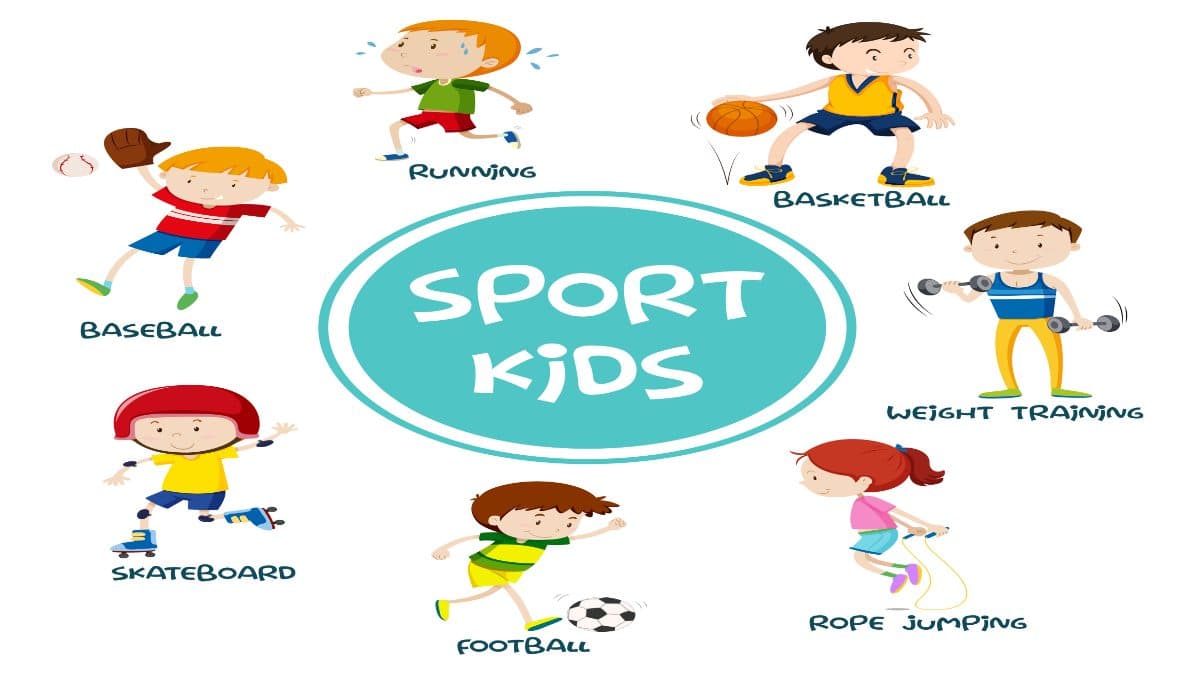How Sports Shape Kids’ Lives: Strength, Joy & More
By Pinkey Sharma |
Date 13-08-2024

Table of Contents
- Why Playing Sports Is Important for Children
- Benefits of Sports For Kids (Physical, Mental and Social)
- Reasons Why Sports Are Important for
- Improves Mental Health And Emotional Well-being
- Trains Social Skills and Teamwork
- Benefits of Sports for Kids
- Building Muscle, Bone, and Joint Strength
- Health benefits of sports for kids
- The Working Children: Treating You While Working (in order of most recent):
- The Importance of Sports in Everyday Life
- Focusing Better During Class
- Participating in Youth Sports: The Benefits of Child Development
- Physical Activity for Kids
- Outdoor Sports and Activities for Children
- Sports Programs for Kids
- Kids Physical Fitness
- Healthy Habits for Kids
- Team Sports for Kids
- Youth Sports Programs
Admissions Open for
In an era when screens dominate time spent after school, it is essential to promote sports for kids now than ever. The sports world is not solely focused on winning and losing, rather sports have emerged as an excellent medium for nurturing physical, mental and social health with education. In this comprehensive guide, we will discuss the numerous benefits of sports for children and how encouraging our children to engage in athletic activities is one of the best investments we can make in their future!
This is the reason sport is so beneficial for children
Why Playing Sports Is Important for Children
Sports provides a special foundation from the playground to organized leagues. They not only teach valuable life lessons, they promote healthy habits, and foster a sense of community. Exercising through sports complements a growing child's well-being, establishing a durable base for more prosperous and healthier days ahead.
Benefits of Sports For Kids (Physical, Mental and Social)
-
The benefits of sports stretch well beyond the playing field. So lets breakdown the top advantages
-
Physical Health Sports improve cardiovascular health, strengthen muscles and bones, and help you achieve a healthy body weight.
-
Mental Well-being Sports also help to reduce stress, anxiety, and depression, and they enhance self-confidence and self-esteem.
-
Social Skills Team sports promote teamwork, cooperation, communication, and sportsmanship.
-
Emotional Intelligence Sports teach kids resilience, emotional management, and graceful defeat acceptance.
-
Physical activity increases concentration and focus, cognitive performance, and academic achievement.
.png)
Reasons Why Sports Are Important for
Helps To Build Muscle And Get in Shape
- Sports and exercise are one of the key factors to achieve this, regular physical exercise is very important for the overall health and for the fitness of the children. Playing sports promotes cardiovascular health, strong muscles, and bones, and motor skills, and helps children maintain a healthy body weight. By taking these precautions early on, you greatly mitigate the risk factors for childhood obesity, type diabetes, and several other lifestyle-related illnesses
- Childhood obesity is on the rise which poses severe health risks, however, partaking in sports can counter is by getting kids to be active. Sports activities don’t only burn calories, but they can also boost metabolism, and build strength and mobility. Federal health recommendations call for youth ages to 7 to get at least 0 minutes a day of moderate-to-vigorous physical activity, and sports are a fun way to satisfy this requirement.
- Sports are an integral part of the motor skills development in children. Most sports involve a wide range of movements, coordination, and balance, which all improve agility, speed, endurance, and general body control. These motor skills are transferable to many dynamics in a person life.
- In addition, sports can help children develop good lifelong habits and build a health lifestyle. In fact, adolescents who engage in sports are eight times likely than their non-playing friends to be physically active by age 4 — which speaks volumes about the role of youth sports to build lifelong habits of fitness. For instance, sports educate children on caring for their bodies through eating properly and stretching, with fitness habits that are continued into adulthood
Improves Mental Health And Emotional Well-being
Sports are a natural form of mood elevation! Exercise releases brain chemicals that make you feel good. Participating in sports can help relieve stress as well as decrease anxiety and depression, promote positive self-image.
Trains Social Skills and Teamwork
Playing on a team teaches kids to work collaboratively, following rules, or grace in victory and defeat. They come to trust their teammates, creating a bond and respect for each other.
Benefits of Sports for Kids
- Physical sport playing is an excellent source of routine physical exercise, and children need one for their holistic health. Sports are good for children’s cardiovascular health because they get them up and moving; burn calories, increase metabolism and muscle strength and mobility.
- Childhood obesity rates are higher than ever, putting children at greater risk for used serious health conditions, such as type diabetes. Many hours spent on the couch or bed looking at social media or playing video games add to the problem. According to federal health guidelines, youth ages to 7 should have at least 0 minutes a day of moderate-to-vigorous physical activity. One way is to play sports. Yeah, believe it or not adolescents that played sports are eight times more likely to be physically active at age 4 than their non-playing counterparts.
- Sport participation in children has so many benefits that include reduced risks of obesity, cardiovascular fitness, healthy development of bones, ligaments, tendons and muscles, gross motor skill development, improved coordination and balance, relaxation, sleep, and performance in school. Exercise stimulates muscles to use the sugar floating around in the blood, converting the glucose into energy. This helps maintain lower sugar levels and lowers the chances of contracting diabetes.
- Participating in organized sports may also be enjoyable for your child, as well as promote many advantages outside of physical fitness. Structured sport offers benefits for your child's social, emotional and psychological health. It can also help your child create healthier ways to cope with the ups and downs of life.
Building Muscle, Bone, and Joint Strength
- Engaging in sports helps in building strong bones, muscles, and joints which promote physical well-being and overall health.
- Enhancing Heart and Blood Vessel Health
- Playing sports improves the cardiovascular health of children when they exercise regularly, which means less heart disease as they get older and other diseases.
.png)
Health benefits of sports for kids
Boosting Total physical well-being
Physical health: sports help to develop the cardiovascular system, muscle and bone and to maintain healthy body weight This comprehensive advantage equips children with the tools for a healthier and more active lifestyle, forming a strong foundation for their well-being in adulthood.
Because sports activity acts as a trigger to build and maintain bone density8 and muscle mass Many of the activities involved in sport are weight-bearing, so help bones become stronger and reduce the likelihood of osteoporosis later in life4. It also promotes muscle growth, increasing strength, endurance, and physical performance4. Not only is participating in sports good for the musculoskeletal system, it can also reduce muscular tensions like headaches or back pain.
Sports are also significant in maintaining body weight at a healthy range4. The regular exercise burns calories, preventing excess fat and reducing the risk of obesity and diseases associated with obesity. In addition, they really increase metabolic rate, which permits the body to use the nutrients in a more efficient way and preserve its energy balance. With childhood obesity on the rise, it's an important benefit of sports today.
The Working Children: Treating You While Working (in order of most recent):
Sports shape cardiovascular and respiratory health, so that the hearts and lungs of children work efficiently.
The Importance of Sports in Everyday Life
-
Sports: Better Everyday Functioning and Well-being
-
By promoting fitness, mental health and socialisation, sport contributes to physical, mental and social functioning and general well-being.
-
Using Sports as a Tool for Mental Relaxation and Stress Relief
-
Sports can serve as an effective mental activity to relax the mind and reduce stress, helping kids unwind and recharge after a particularly long day at school.
-
Kids Doing Yoga A group of kids practicing yoga in a park, emphasizing the need for mindfulness and relaxation to de-stress.
-
It is not only the reading, writing and math that needs to be focused on in school, but also sports.
-
Promoting Academic Outcomes Through Physical Activity
-
Good the lack of exercise also increases obesity rates, which negatively impacts academic performance.
Focusing Better During Class
-
Regular participation in sports helps with concentrating and focus in class, leading to better academic performance. This correlation has been shown to correlate at most older ages, but not necessarily in every age demographic, suggesting how the time spent in the field, court, or track can translate into the classroom, if it is well supported.
-
4The impact sports participation has on your ability to concentrate and focus are derived from a number of different physiological and psychological mechanisms. Exercise gets the blood flowing into the brain, bringing with it more oxygen and nutrients that are vital to functioning well cognitively4. Such an increase in circulation can positively impact alertness, attention span, and mental clarity4—all important factors in learning efficiently.
-
In addition, engaging in sports encourages the release of neurotransmitters, including dopamine and endorphins, which are essential for mood regulation, stress alleviation, and cognitive improvements as well. These neurotransmitters reduce anxiety and enhance focus, which allows a more conducive learning environment. Through reducing stress and improving mood, engaging in sport enables students to attack their studies with a more uncluttered and focused mind.
-
However, it should be noted that the relationship between sport participation and academic performance is complicated, and that involvement in high-level sports may negatively affect academic performance. While sports participation is typically positively associated with cognitive performance, one study noted that young elite athletes perform worse academically than control students. However, overall participation in youth sports enhances attention and focus in school, resulting in improved academic performance
Participating in Youth Sports: The Benefits of Child Development
- Autonomous Cognition and Analytical Reasoning
- Sports also promote cognitive development and critical thinking as children are challenged to make snap decisions, solve problems, and adjust to variables.
- Its Benefits—Building Emotional Resilience Through Sports
- One, they help kids develop resilience — the ability to cope with disappointment, work through adversity and recover from defeat.
Physical Activity for Kids
Why Growing Children Should Exercise Regularly
-
Physical exercise is important for growing kids; it aids in healthy development and, reduces obesity and lowers chronic disease risk.
-
Play Structured Fun Activities to Get Kids Moving
-
The key to getting kids moving is by making exercise fun and entertaining.} Learning more about this will help you understand it better, so consider activities such as dancing, swimming, playing tag, and riding bikes4.
Outdoor Sports and Activities for Children
Why Outdoor Play is So Good for Kids
- Outdoor play is essential for healthier kids, allowing for physical activity, exposure to sunlight (Vitamin D), and exploration of nature4.
- Outdoor Sports that are Best for Kids Growth & Development
- Popular Outdoor Sports For Children Growth Along With Development Soccer, Basketball, Swimming, Baseball, Track and Field All of these sports have different advantages that impact a child’s health both physically, mentally, and socially. It is necessary for healthy development, motor skills, and roots for life skills.
- Soccer is a sport that is popular around the world, making it a great medium for kids to engage in physical activity while working on their cardiovascular health, coordination, and teamwork. It consists of running, kicking and thinking, and increases stamina and your agility. Soccer also teaches children about discipline and fair play and working together.
- Another great option for both cardio health as well as developing hand-eye coordination is basketball. Fast-paced, this sport demands reflexes, strategy, and teamwork, with players developing communication and co-operation. Basketball is a stop-and-go game that allows for quick bursts of energy and strength both upper and lower body.
- It is a one-of-a-kind sport, as it delivers a total body workout with low impact on your joints. It is good for cardiovascular health, muscle strength, and endurance while maintaining coordination and balance. Swimming is a great life skill that helps with water safety, confidence building, etc.
.png)
Sports Programs for Kids
Sports programs teach children to follow rules, respect authority, and commit to training schedules most of all, and these traits help to keep children out of trouble.
Kids Physical Fitness
Why Physical Fitness Is Important In Childhood Development
Childhood development: Physical is the key: Physical fitness plays an important role in child development Incorporating healthy habits early in life provides a strong foundation for lifelong well-being and minimizes your risk of developing chronic diseases later in life. So under the addiction of screens and sedentary life, ensuring fitness for Children is utmost important.
What that number signifies is that physical fitness, aside from physical benefits, is also important in terms of a child's cognitive7 and mental well-being7. Exercise boosts blood flow toward the brain4, generating new neural connections, a crucial factor for enhancing cognition. Physical activity is also linked to increased motivation, concentration and memory, which are already crucial for academic achievement. Finally, exercise promotes better sleep, thus contributing to mental acuity.
Healthy Habits for Kids
Teaching Healthy Habits Through Sports and Activities
Sports and other forms of exercise can be a great way to teach healthy habits like proper nutrition, regular exercise, and adequate rest. Children are not only keeping fit but also developing healthy practices that will stick with them for the rest of their lives through engaging them in sports.
Involvement in sports stresses on the necessity of regular exercise, highly essential for a healthy way of life. Playtime is key to all aspects of development: Social, Emotional, Cognitive, and Physical, at a young age and forms the basis for a healthy lifestyle, opening up a whole world of healthy habits. This exposure allows them to realize that exercise should not be performed simply to check it off a list but can be a fun part of their daily lives. Playing soccer or basketball not only benefits cardiovascular health, but also boosts coordination and power, for example. These experiences are instrumental in creating a favorable perspective toward physical activity, motivating children to be active outside of the structures of organized sports.
Sports also enhances social interaction and teamwork skills which are essential for healthy development. Learning to work with teammates and building communication skills while learning to respect others are skills used at all levels of life. Social experiences like these develop emotional intelligence and resilience as kids face wins and losses in the field — on and off the pitch.
Team Sports for Kids
-
Why Team Sports Are Good For Children
-
Team Sports For Children Team sports can teach your child so much, such as cooperation, communication and leadership.
-
What Team Sports Teach Us About Collaboration And Leadership
-
Team sports teach collaboration and leadership, as they force kids to work together toward a common goal, respect each other's strengths and pick up each other's weaknesses.
Youth Sports Programs
-
How to Choose the Right Youth Sports Program for Your Child
-
When selecting a youth sports program, keep in mind your child’s interests, skill level and personality. Find programs that focus on skills, sportsmanship, and enjoyment
.png)
Conclusion
Engaging a child in sports opens a pathway to success in their adult life. In addition to physical benefits, sports can help build mental resilience, social competence, and community. The bestest goal of all is encouraging kids to be active and involved in sports gives them the key to making healthy, active, and well-adjusted lifestyle choices. Let’s get kids off the couch, onto the field, and into higher levels of their lives (literally) through sports!
Spread the knowledge and spark conversations by sharing this article with your friends!
Related Blogs
The Importance of Sports: Explore the importance of sports in student life
Choosing the perfect sports for kids: Right Age for Admission: Every parent feels confused about their child's early school enrollment.
Why free play is critical for kids: This article reviews the CBSE, ICSE, and IGCSE boards, aiding you in making a well-informed decision for your child's educational path.
Other Related Sections
NCERT Solutions | Sample Papers | CBSE SYLLABUS| Calculators | Converters | Stories For Kids | Poems for kids I Practice Worksheets
CBSE Schools In Popular Cities
- CBSE Schools in Bangalore
- CBSE Schools in Mumbai
- CBSE Schools in Pune
- CBSE Schools in Hyderabad
- CBSE Schools in Chennai
- CBSE Schools in Gurgaon
- CBSE Schools in Kolkata
- CBSE Schools in Indore
- CBSE Schools in Sonipat
- CBSE Schools in Delhi
- CBSE Schools in Rohtak
- CBSE Schools in Bhopal
- CBSE Schools in Aurangabad
- CBSE Schools in Jabalpur
- CBSE Schools in Jaipur
- CBSE Schools in Jodhpur
- CBSE Schools in Nagpur
- CBSE Schools in Ahmednagar
- CBSE School In Tumkur

Call Us to know more about Orchids
Swipe Up

.jpg&w=1920&q=80)














